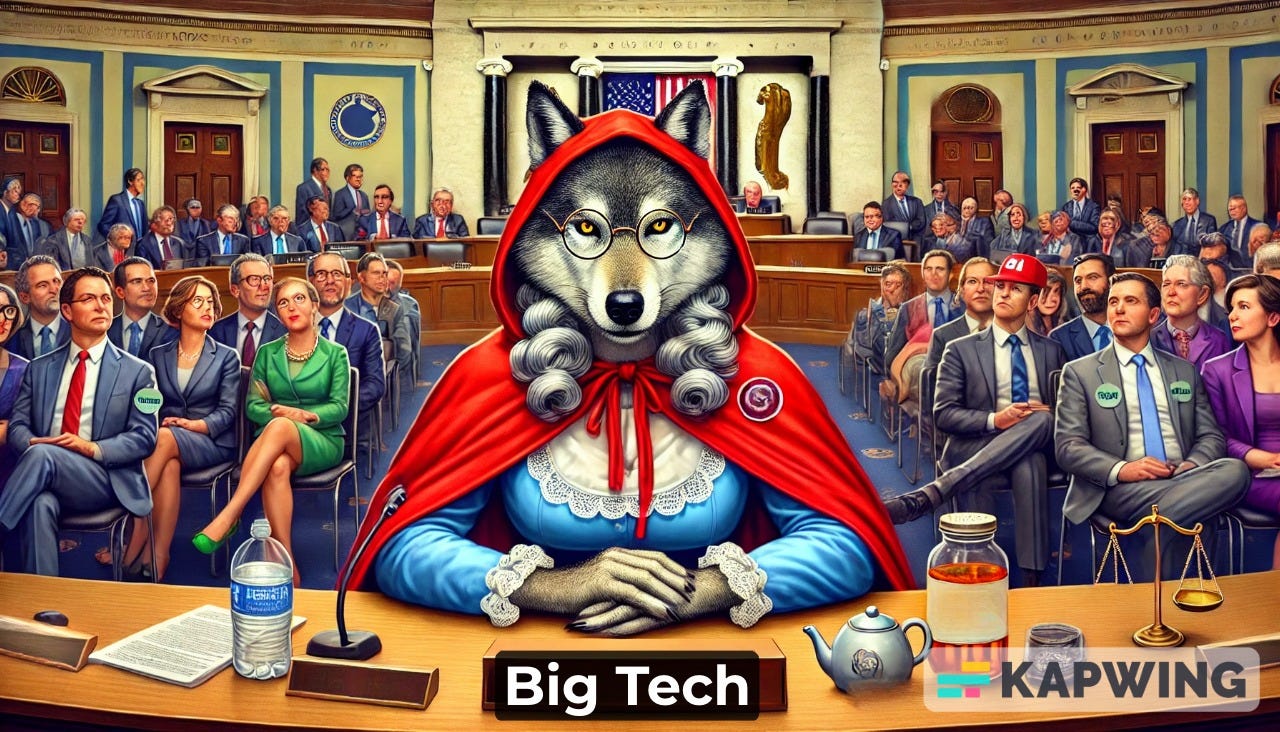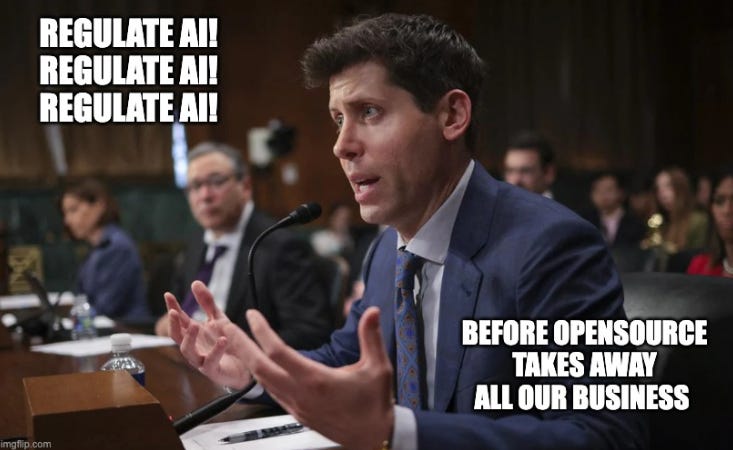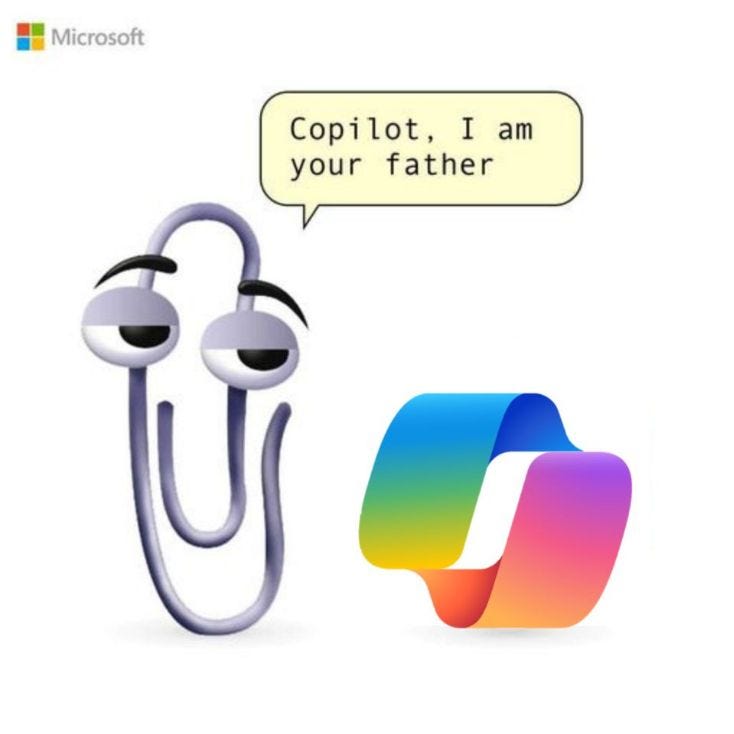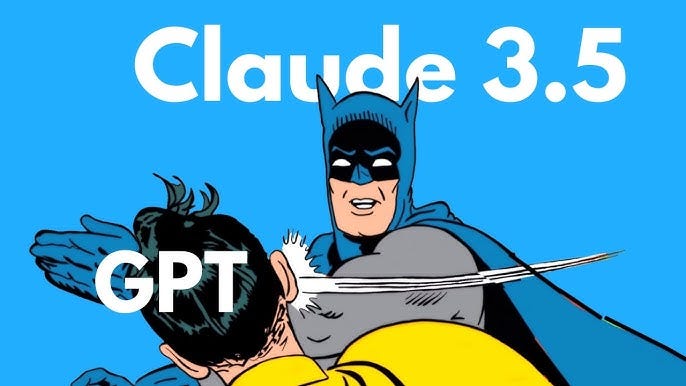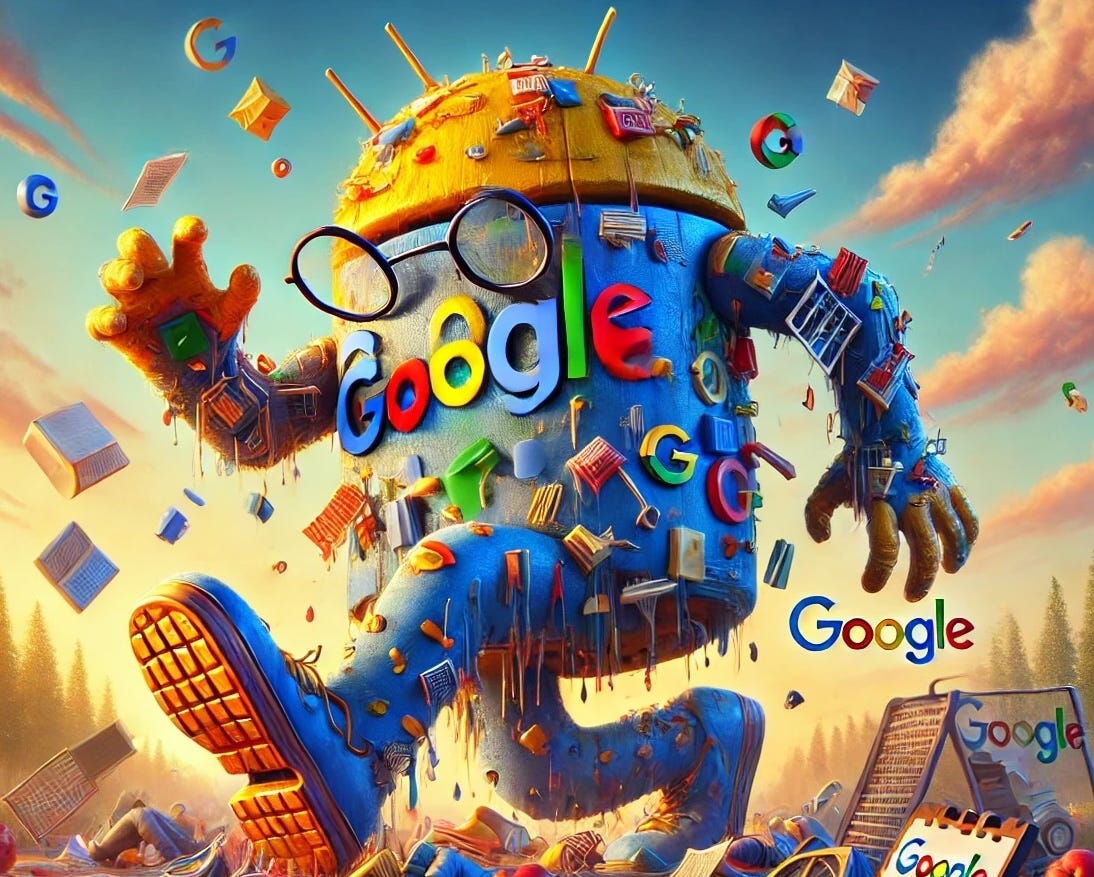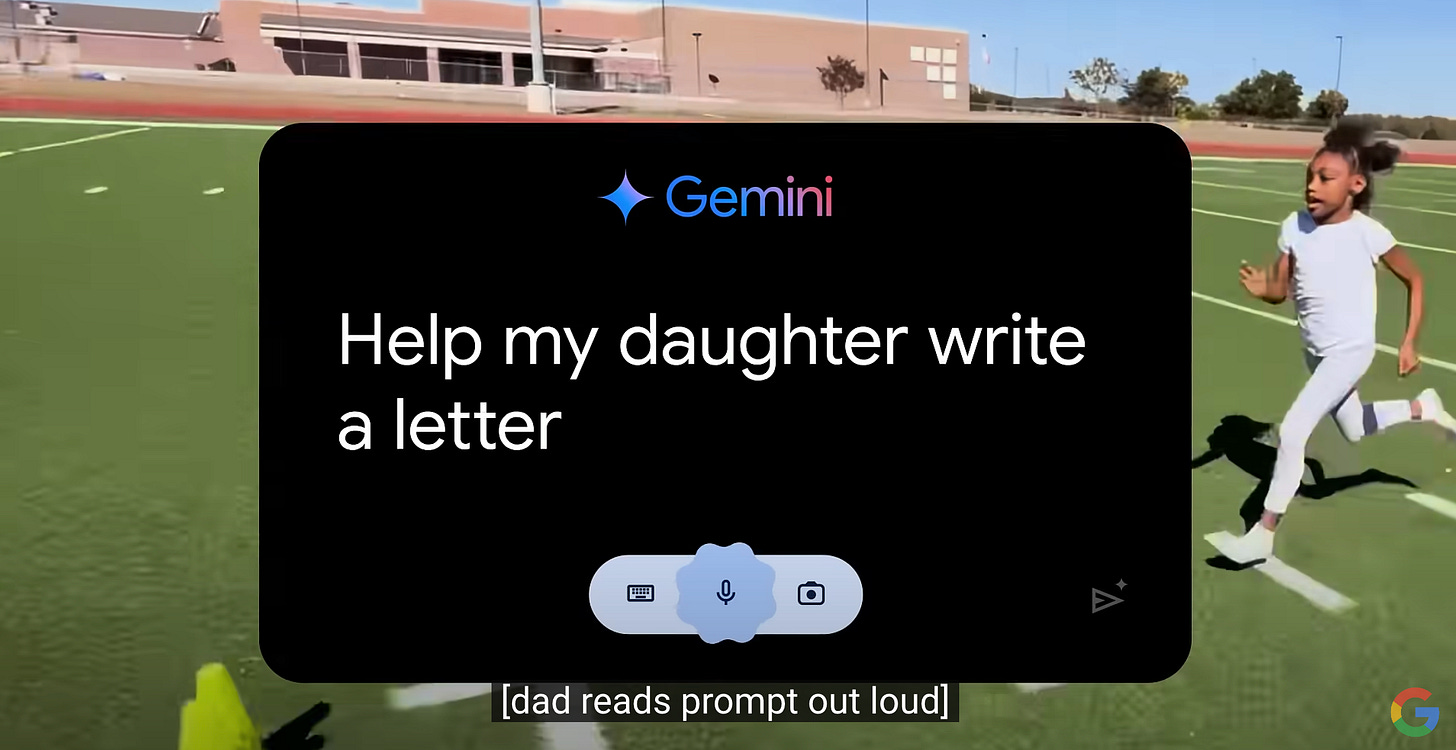AI and the Narrative Reset of Big Tech: How Meta Became the Unlikely Protagonist
Companies that were once seen as innovators are now struggling to keep pace, while others have found unexpected opportunities to redefine themselves
TLDR: Mark Zuckerberg’s open letter, "Open Source is the Path Forward," positions Meta as the protagonist in the AI race. The letter demonstrated the most purposeful and authentic narrative among its peers.
In July, Mark Zuckerberg issued an open letter, "Open Source AI Is the Path Forward," which received wide acclaim from everyone in technology with the exception of Meta's peer companies, which have spent billions of dollars developing foundation models. Shopify CEO Tobi Lutke said "Llama 3.1 is an 'incredible gift'" and Paul Graham, cofounder of startup accelerator Y Combinator, called the letter "eloquent."
About a week later, Bloomberg published an interview, which showcased a confident, articulate leader, comfortable discussing everything from Meta's open-source AI strategy to his hobbies, all while artfully dodging political bullets he's been struck by before.
The Zuck we see today is a far cry from the awkward, hoodie-clad CEO portrayed in "The Social Network."
While his transformation might feel sudden, the key to his successful reinvention reflects years of personal growth and strategic pivots at Meta.
Training the Zuck 3.0 LLM
There is a running joke across X and reddit that this new version of Zuckerberg is the most lifelike version yet. Even the Wall Street Journal is in on the fun:
If 1.0 was a dorm room disruptor in a hoodie and flip flops and 2.0, a chastened CEO appearing before congress in a suit and tie, 3.0 is a dgaf podcast bro espousing the promise of AI in a gold chain and sunglass tan.
The key to Zuckerberg's reinvention lies in three areas:
He has shown great interest and success in learning things outside of the technology world. Over the years, tidbits of Zuck's hobbies have dripped out onto the internet: the level of his Chinese shocked students in Beijing, he won an MMA tournament, and most recently on the 4th of July, he showed off his wakeboarding skills in a tuxedo, while drinking a beer. These aren't just random pursuits; they're part of a deliberate effort to broaden his horizons and challenge himself outside his comfort zone.
He has shown resilience and a willingness to learn from his mistakes and adapt to changing circumstances. He was the main character of the aforementioned less than flattering biopic, has steered Meta through multiple crises, and has survived multiple congressional skewerings. Throughout, his leadership style, communication skills, and public image have become more mature, confident, and authentic (even with a Gen Z haircut). Most importantly he’s also able to laugh at Zuck Memes.
His approach seems purposeful. In his letter and interviews, the rationale tracks with his history of frustration from dependency on closed platform. Here is Mark from the Bloomberg Interview:
”It’s somewhat soul-crushing to go build something that you think is going to be good and then just get told by Apple that you can’t ship it because they want to put us in a box because they view us as competitive.”
He's not just reacting to the latest trends; he's crafting a narrative that aligns with his experiences and Meta's long-term goals. This purposefulness gives his message a weight and authenticity that resonates with both the tech community and the public.
The Rest of Big Tech is... in D.C. Advocating for Regulation?
While Meta “stumps” for open-source AI, other tech giants are taking a different tack. Microsoft, OpenAI, and Google are pushing for tight control over AI development and regulation, arguing that the technology is too dangerous and fast-moving to be widely accessible.
This approach has drawn criticism from industry players and experts, who accuse these companies of regulatory capture - attempting to influence regulators and lawmakers to serve their own interests rather than the public good. Critics argue that such a closed approach would stifle innovation, competition, and accountability, allowing tech giants to avoid scrutiny over the current and potential harms of their AI systems.
In a New York Times Hard Fork interview with Sam Altman, Casey Newton asks what Sam thinks about AI regulation. He responds:
What we believe is that on the frontier systems, there does need to be proactive regulation there. But heading into overreach and regulatory capture would be really bad. And there’s a lot of amazing work that’s going to happen with smaller models, smaller companies, open-source efforts. And it’s really important that regulation not strangle that. So it’s like I’ve sort of become a villain for this
The contrast between Meta's open approach and the closed stance of its competitors has positioned Zuckerberg's company as an unlikely hero among VCs, startups, and small tech firms. It's a dramatic reversal of roles that few could have predicted.
What Zuckerberg Wants is Clear; What About Everyone Else?
The push for open-source AI serves multiple strategic purposes for Meta.
It aligns with Meta's core business model of building experiences and services rather than selling AI model access. This approach doesn't undercut Meta's revenue, unlike for closed model providers, and ensures the company always has access to cutting-edge technology without being locked into a competitor's ecosystem. It's a defensive positioning that leverages Meta's strengths in open-source development, building on their history of successful projects like the Open Compute Project, PyTorch, and React.
By open-sourcing Llama, Meta aims to build a moat by developing a full ecosystem of tools, efficiency improvements, and integrations. This strategy seeks to make Llama the industry standard by being consistently competitive, efficient, and open across generations. The approach allows Meta to compete with closed model providers without directly selling AI access, as Zuckerberg believes AI development will continue to be highly competitive.
The strategy aligns with Zuckerberg's long-term vision for AI and geopolitical considerations. He sees open-source as necessary for a positive AI future, ensuring wider access to AI benefits and potentially safer, more transparent AI systems. From a geopolitical standpoint, Zuckerberg argues that closing off models won't prevent adversaries like China from accessing the technology. Instead, he believes the best strategy is to build a robust open ecosystem and work with allies to maintain a first-mover advantage.
Microsoft the Opportunist
Microsoft's AI strategy has been opportunistic, but perhaps lacking in long-term vision:
They scored early wins by partnering with OpenAI and supporting Sam Altman during the OpenAI board coup last year. This move initially seemed to give Microsoft a rare first-mover advantage in the AI space.
The boardroom coup at OpenAI in November 2023 was a dramatic event where Sam Altman was briefly ousted as CEO, only to be reinstated days later after intense pressure from employees and investors, including Microsoft. This episode highlighted the complex dynamics within OpenAI and Microsoft's significant influence over the company.
However, their implementation has been somewhat underwhelming. The launch of laptops with special Copilot buttons was met with a lukewarm response from critics.
Microsoft's focus, while not exactly exciting, leverages the trust they've built across corporate America. Their Copilot adoption page features articles like "It's not about AI -- it's about trust," emphasizing their established B2B relationships.
This approach, while not inspiring, carves out a dedicated B2B lane that Microsoft is well-positioned to dominate. In the corporate world, the path of least resistance often wins, and Microsoft's existing foothold gives them a significant advantage.
Apple Doing Their Walled Garden Thing to Sell Devices
Apple Intelligence is quintessentially Apple - how can we make it our own thing that enhances our product ecosystem and drives upgrades?
Initially, investors were bullish about Apple Intelligence. However, media sentiment has cooled considerably since the initial reveal.
Recent reports suggest Apple Intelligence won't be rolled out all at once, and Bloomberg’s Mark Gurman gave a critical review of the iOS 18 Beta, stating he was "hard-pressed to believe that anyone who has actually used Apple Intelligence would think this is going to drive iPhone sales this fall."
While Microsoft focuses on B2B, Apple is going all-in on the consumer market, staying true to their core strategy of creating a seamless, integrated user experience within their ecosystem.
OpenAI: The Hype Generator
OpenAI has been at the center of the AI hype cycle, but not without controversy:
They kickstarted the current AI boom with ChatGPT, capturing public imagination and setting off a race across Silicon Valley.
CEO Sam Altman has faced criticism for misleading statements about financial ties to the company and changes in corporate structure that seem at odds with their stated mission of developing "safe AI."
The company’s dramatic boardroom coup last November highlighted deep internal tensions. The board abruptly fired Altman, citing concerns about his candor and transparency.
While the coup ultimately failed, it exposed the fragility of OpenAI's unique governance structure and the competing visions for AI development within the company between those prioritizing AI safety and those focused on rapid progress and growth. It also shows a continued lack of trust between OpenAI leadership and management.
This dynamic continues to play out.
This week the WSJ wrote that OpenAI has had a tool developed for two years that can help detect text written by AI, but had debated releasing it for two years.
On July 1, whistleblowers from OpenAI sent an open letter to the SEC, urging an investigation into the company's potential NDA-related regulatory breaches.
In the weeks prior, nine present and past OpenAI staff members penned an open letter highlighting the dangers associated with generative AI.
There has been and exodus of talent from OpenAI; only three of the original 11 co-founders are still at the company. Most recently John Schulman, a key figure behind ChatGPT's success, announced his departure from OpenAI to join rival firm Anthropic.
Anthropic: The Quiet Achiever
Anthropic has taken a different approach, focusing on product quality over publicity:
Anthropic's user base is extremely positive about its Claude models, praising their capabilities and reliability.
The company is led by CEO Dario Amodei, whose leadership style is markedly different from the more public-facing approaches of Sam Altman or Mark Zuckerberg. Amodei maintains a lower profile, focusing on technical excellence and Anthropic’s purpose rather than grand pronouncements. In a Time interview from earlier this summer, Amodei says, “I more want Anthropic to be a company where everyone is thinking about the public purpose”
This lower profile has had some benefits -- Anthropic is rarely the first to be blamed when it comes to AI-related controversies, such as students using AI to cheat on homework.
Anthropic's seems to prioritize steady progress over flashy announcements, which has earned them respect within the AI community but less mainstream attention.
Google: The Stumbling Giant
Of all the big tech companies, Google's AI narrative has been the least coherent:
Google's approach has seemed reactive rather than strategic, bending with the wind of every new AI hype cycle.
Their AI models have been consistently ridiculed for underperforming compared to competitors, despite Google's vast resources and data advantages.
Surprisingly, Google's AI offerings don't seem to capitalize on what should be their biggest strength - their proprietary data from Search, Maps, and other services.
It’s ironic that the latest hype cycle around OpenAI's Search GPT is potentially leading us back to search I can't help but wonder why Google didn't double down on improving their core search product with AI from the start, given their dominance in this area.
Google's marketing efforts have also faced setbacks. They recently had to pull their Olympics ad, which showed a father using AI to help his daughter write a letter to her sports hero.
Even their response that the "Ad tested well before airing" seems tone-deaf, suggesting a lack of vision and understanding of public sentiment around AI.
Winners and Losers from Meta’s open-source push
Meta’s open-source Llama model is shaking things up. Let's break it down:
Winners:
Startups and small dev teams: Suddenly, they've got access to top-tier AI engines for the price of free.
Academia: Researchers can now poke and prod at top-tier AI without needing a Silicon Valley budget.
The AI-curious public: The barrier to entry just dropped drastically.
Losers:
Big Tech & Closed-model companies: How do you compete with free?
AI has Reset the Narratives of Big Tech
Meta's bold open-source gambit has positioned them as an unlikely champion of democratized AI, while traditional tech giants like Google and Microsoft seem to be struggling to find their footing. Apple, true to form, is pursuing its own walled garden approach, while OpenAI grapples with internal tensions and a shifting public image.
The dynamics at play have been incredibly interesting. As a "startup" (in quotes because of its significant backing), OpenAI has more room to innovate quickly. There's less of an established reputation at stake compared to the bigger companies.
Conversely, giant corporations like Google are forced to act swiftly, something that mega-corporations are notoriously bad at doing. Their actions carry substantially more reputational risk. For example, when Gemini released its image generation tool in a state that overcorrected for racial bias, they were universally panned and became the latest target of right-wing criticism, accused of going "woke."
One of the most fascinating outcomes of the AI revolution is how it has reset the narratives of Big Tech. Companies that were once seen as innovators are now struggling to keep pace, while others have found unexpected opportunities to redefine themselves. This shift has not only impacted their technological standings but has also reshaped public perception and corporate identities. As AI continues to evolve, it's likely we'll see further transformations in how these tech giants are perceived, their roles in the industry, and their relationships with users and regulators alike.
Thank you for reading
I hope you enjoyed this week’s entry. Let me know if you would like to explore any specific topics in upcoming editions. My inbox is always open.




